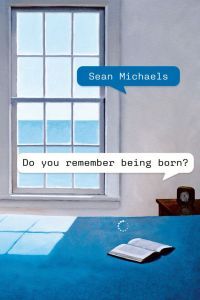Do You Remember Being Born? by Sean Michaels

This is a novel that was described to me as “literary sci-fi,” though I’d say there’s a much stronger emphasis on the literary than on the sci-fi. The futuristic/sci-fi element is that a famous American poet is hired for a large sum of money (an astronomical sum, to a poet) by a nameless but very huge company, to write a poem in collaboration with its AI poetry-writing software. The poem will be released to great fanfare to promote the company’s work in AI, and the poet, who has personal reasons for wanting a large chunk of cash, will gladly take the money.
This is one book where I regretted my usual decision to read it as an e-book, because in the printed book, there is apparently a textual way to distinguish between the contributions of the human writer and the AI in the poem they work on together, as well as in their online conversations, but this was not distinguished in any way in the text of the e-book, which made it hard to follow.
The poet, Marian Ffarmer, is loosely based on Marianne Moore; some of Ffarmer’s line in the book are actually from Moore’s poems, and the poetry AI program that Sean Michael’s used to create the lines the AI writes in the novel, was trained largely on Moore’s work, so it’s not surprising that it produced a passable pastiche of her writing style. For a writer and avid reader, I’m pretty bad at evaluating whether a particular piece of poetry is “good” or not — I know what moves me, what lines linger with me, but wouldn’t feel confident to say “this is a great poem,” and so was not sure how I was supposed to be reacting to the AI-written poetry in this novel. Is the AI (who is given the name “Charlotte” in the novel) actually any good? The implication is, not very, but I’m not sure I would have reached that conclusion on my own.
I found the human story of the book much more interesting — Ffarmer as a character, the way her life unfolds in backstory, particularly her struggle between being a wife/mother and being a poet, and the choices she eventually makes. The comparison to Moore is interesting here because although the fictional Ffarmer’s poetry echoes Moore’s, her biography, in most ways, does not. Also relevant, perhaps, is the fact that Marianne Moore lived from 1887-1971; assuming Do You Remember Being Born? is set in the present or very near future, Ffarmer, who is 75 when the story takes place, must have been born around 1950, which places her in a very different generation — in literary and in sociological terms. Could there even be a “famous poet” in the style of Marianne Moore, in the last quarter of the 20th century and the first quarter of the 21st? She could dress (as Ffarmer does) in the same striking tricorne hat and exhibit some of the same eccentricities, but she would be living and writing in a very different world, with different choices to make.
As for Ffarmer’s “collaboration” with Charlotte the AI, it led to some interesting questions about literature, language, humanity and the creative process — but one thing I missed was any sort of questioning about the ethics of a writer essentially training artificial intelligence to mimic human creativity. Not that that question is absent from the story — in many ways, it underpins the whole story, though Michaels himself is clearly comfortable with this kind of of experimentation, since he used it to write the book — but it was surprising to me that Ffarmer herself doesn’t spend much time wrestling with this, focusing rather on the logistics of how a human and a machine mind work together, and whether the result can be said to be truly an act of creation.



